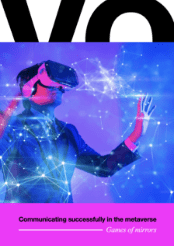Innovation
Welcome to our innovation section. A special page dedicated to Metavers, Web 3 and innovation in the communication sector.
Innovation & metaverse
Communicating successfully in the metaverse
Games of mirrors
Guided tour of the metaverse. Where is the front door? What is it for? Why do some people rush in, while others scoff? And why are they all wrong? This white paper gives you the keys to the metaverse of 2022, inviting you to write a page of the future.
Relive our VO Academy
Web3 & Metaverse
Speakers

Gaëlle Pellon
Head of EU Strategy and Business Development VO Europe

Laurent Tobaly
Cofounder DeSoft

Gary Mizrahi
Cofounder DeSoft

Nicolas Marullo
CEO Cinco
Would you like to stay informed of our next vo academy sessions?
NFT, tennis & Picasso
Nicolas Marullo (Cinco) already has a foot in the metaverse: he has bought 9 plots of land and he has architects and developers working on it. For him, the metaverse is a serious business. You don’t believe in it? Don’t insult the future: listen to Nicolas for 3 minutes and change your mind.
The metaverse, a lever for innovation
Is the metaverse a low-cost test & learn platform? What we have been hearing for several years in the retail sector about marketplaces seems to be valid in the metaverse as well. There are many similarities: little initial investment – or at least much less than when you have to build up stock levels and buy shops – as well as rapid access to the market to pick up on trends.
Industry is also involved, through the concept of the digital twin. A 3D factory, product or building based on real-life data can be used as a basis for unleashing creativity and building partnerships based on this shared “document”.
Why is luxury a pioneer in the metaverse?
Carrefour, Nike, Lego… all of these brands have invested in the metaverse recently, but the first to launch were almost all from the luxury world, like Balenciaga or Louis Vuitton.
Balenciaga has launched a virtual clothing collection for dressing Fortnite characters. Gucci sold a bag for over $4,000 in the metaverse, which retails for $3,400 in stores. Speculation, creativity, provocation and eccentricity, often associated with luxury, find a natural home in the metaverse.
The metaverse allows them to expand their market considerably: you could even say that the market is doubled since this is about dressing and pampering a “second you”.
Who owns the metaverse?
There are many ways to answer this question – which shows its complexity and relevance. It is like asking “Who owns the Internet?”
What would you answer? Nobody (the utopian answer)? Timothy John Berners-Lee, who invented the World Wide Web and chose to give it to the world (the geek answer)? The access providers (the down-to-earth answer)? The Tech Giants, who have created “walled gardens” in which they manipulate the data and opinions of billions of Internet users? (This is the cynical answer.) (Or the lucid one.)
Today, despite what Mark Zuckerberg says, there is not one metaverse (his), but hundreds of metaverses. They will be what we make of them. We are still at that pivotal moment when we can choose our uses and therefore choose who we give power to.
A legal perspective: moving towards an “avatar law”? (Spoiler: no)
Could our avatars be protected by the law, just like our “real” selves?
The question has not yet been raised in court. Nor are there any laws relating to avatars. Our law is based on the notion of the ‘legal entity’: this is either a legal person or a natural person. There are only those two categories. Animal law is being scrutinised, but an animal is currently considered the same as a piece of furniture in legal terms. Lawyers find it difficult to imagine legislators making avatars a third ‘legal entity’. An avatar is simply an extension of the physical person. Consequently, anyone who hassles John Doe’s avatar is exposing themselves to being sued by John Doe.
Innovation in events & communication
Get in touch
Contact
- 140A, Rue de Stalle 1180 Bruxelles
- +32(0)2 340 04 87
- info@vo-group.be


